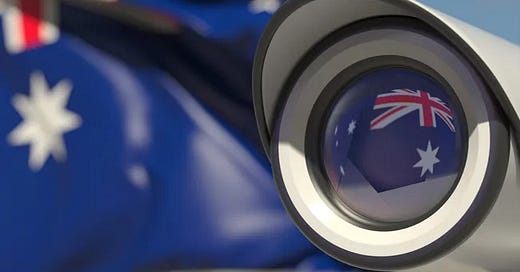Friends,
My apologies for the delay. I thought of re-writing this entry after everything happening with Telegram’s founder. But I thought that was best for a future entry. That said, the parallels with Australia’s policies are very interesting.
I hope you enjoy this one.
Australia: Pioneering Surveillance
It seems on a regular basis, I receive messages about new Draconian measures the country is taking. It reminds me a bit of the 2004 piece ‘What’s the Matter with Kansas?’, which questioned how people could vote against their own interests. In Australia’s case however, it’s the opposite: how can the government put forward policies against the interests of the people? Or perhaps, the people, not knowing their interests, discharge this responsibility to government.
Say for example, a national security threat emerges. Innocent lives are lost and the natural question to ask is: ‘what is the government doing to safeguard the public from future attacks?”. But what if the measures they introduce—like mass surveillance and expanded police powers—are not only unjustifiable but ultimately ineffective? What do we do then? Citizens would have discharged their rights and a government could shrug their shoulders and say,
“Welp, we tried something.”
This is fundamentally not good for our society and for good government.
Let’s look at a clear example that happened in Australia.
A Turning Point: The Sydney Siege
In 2014, a lone gunman took hostages at a Cafe in Sydney, Australia. Eighteen (18) people were captured, with two losing their lives. The gunman, Man Monis, had been engaged in various types of criminal activities and fraud before seeking political asylum in Australia from Iran in 1996. Despite warnings from Iran, Australia granted Monis asylum. Monis’ mental health was brought into question as he pledged allegiance to ISIS - however, the group never associated themselves with him, and Monis himself sought asylum due to persecution for his views on Islam.
A man with a lack of stability committed a horrendous act, claiming the lives of two hostages and forever changed Australian policy.
The Government’s Response: Sweeping Surveillance Powers
Regardless of Monis’ checkered past, his actions in 2014 were enough for the government of Australia to embark on a revamp of its immigration policies. Perhaps aligning with public sentiment (or not), the government moved forward on counterterrorism measures - the most significant being the Telecommunications Amendment Act, 2015.
This now required telecommunications companies to retain metadata (call logs, internet activity) for up to two years, which law enforcement could access without a warrant. By tracking communication, the government justified that it could find out what people were up to, before it turned into something serious.
What’s interesting here is the critical response and clarity that is missing. While assessing Monis’ actions should be attached to an individual, the government’s response affected everyone. And instead of the introspection Australia needed to do for not listening to the government of Iran’s warnings, the policy pursued clearly restricted all citizens’ privacy rights.
Some may agree with these measures if it makes us all safer - it’s just exceptionally hard to prove whether or not these laws indeed make our societies safer.
What We Want Doesn’t Make Sense (Sometimes)
When a shocking event like this occurs, it triggers a powerful collective response. We tend to overestimate how prevalent an attack like this can be. The result? We demand more action from our government.
[side note: observe how many Republicans advocate for less government action, due to ineffectiveness and cost overruns. This is thrown out the window when national security is threatened. Then, the full government apparatus appears, with policies, programs and limitless spending - regardless of how effective any of these measures are. If we include the Wars in Afghanistan and Iraq as part of the response to the attacks on September 11, total government expenditure was approximately $8 Trillion. Critics still debate the effectiveness of any of these interventions.]
The Scary Part: Groupthink
In times of crisis, people tend to look to those around them for cues on how to react—a phenomenon known as social proof. When the majority seems to support restrictive policies, dissenting voices are often drowned out. Media coverage in Australia focused heavily on the threat of terrorism and the necessity of new laws, reinforcing the public’s belief that sacrificing some freedoms was a reasonable price to pay for safety.
So Where Do we Go from Here?
In times of crises, it’s absolutely essential we double down on protecting our democracy at all costs. What does this mean? It means, we have to fill our airwaves with critical voices, who have completed at least some research on the attacker, the motivations and more. This will require a deep level of humility on all our parts to engage respectfully.
Thoughtful debate in times of crises shifts our entire perspective and resists the rush to implement extreme measures. If a crises induces anxiety, thoughtful debate is the meditation, the breathwork, the Calm App. :)
This approach not only calms public anxiety but also pressures governments to implement policies that are balanced and genuinely effective.
The answer isn’t simply more surveillance or more control—it’s a reflective, democratic process where policies are carefully weighed, rights are protected, and the public remains engaged. If we can nurture this kind of culture, we stand a better chance of maintaining both our security and our freedoms in the long run.
So, subscribe, listen and share. We need more voices, your voice and others. Otherwise, Australia won’t be the last place for increased surveillance.




